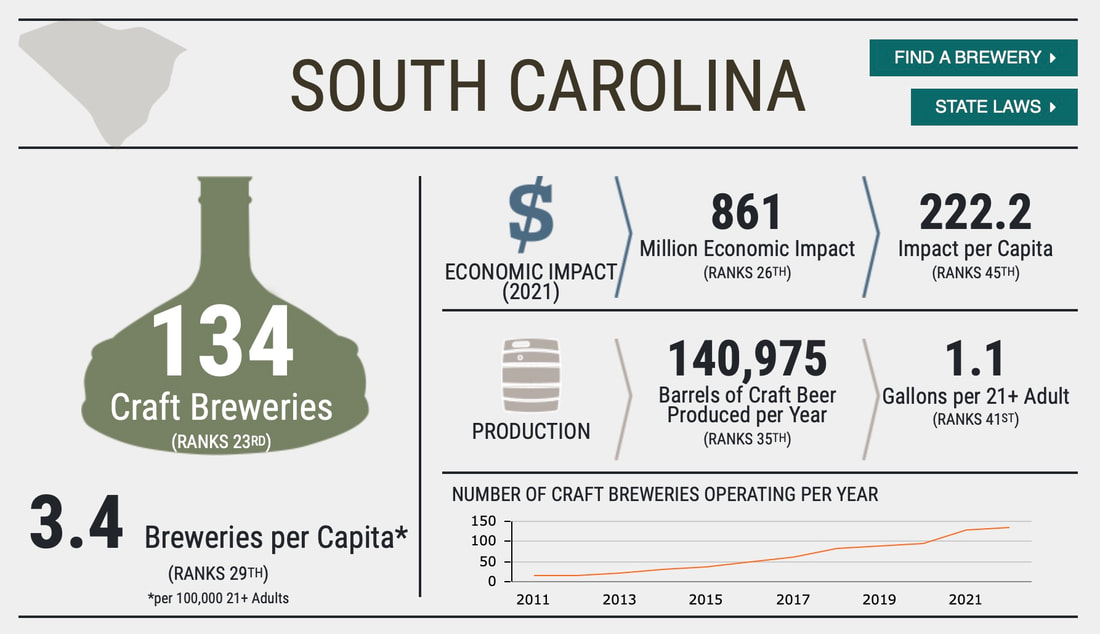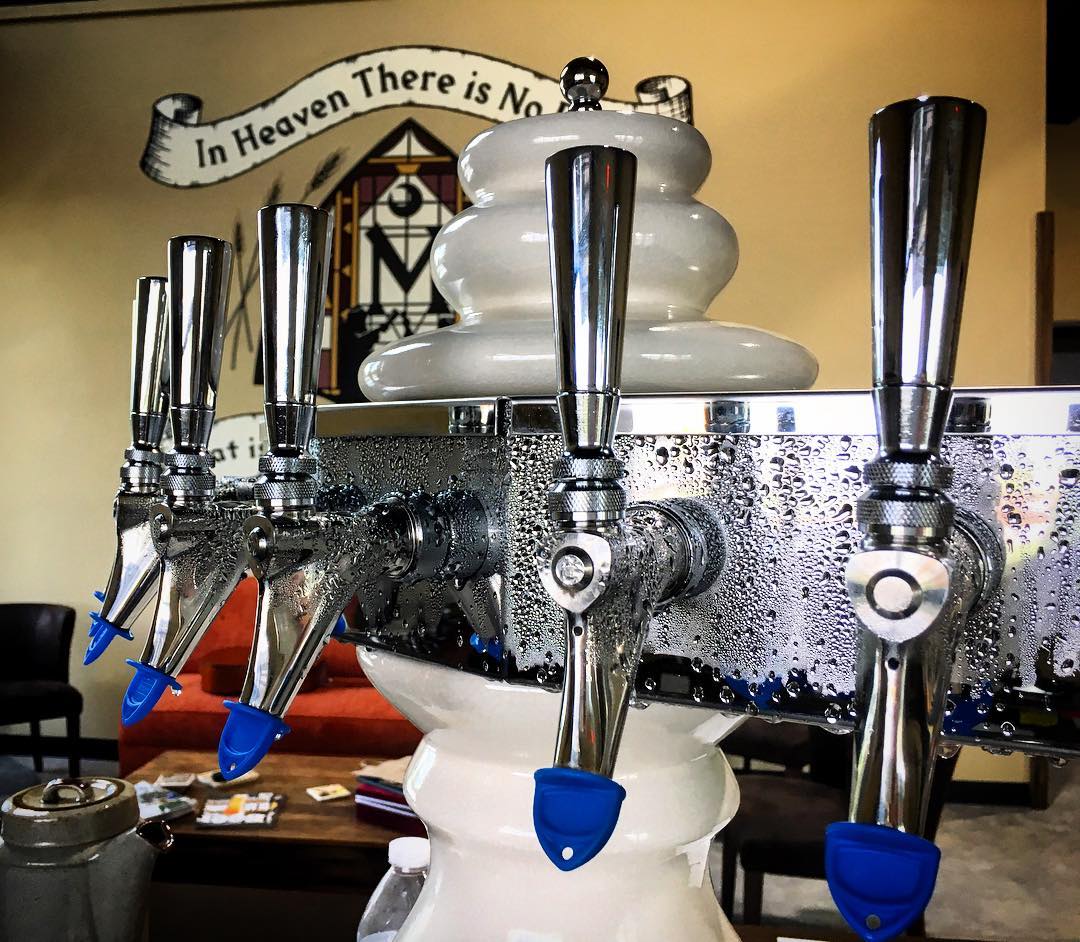|
DISCLAIMER: This post does not constitute legal advice and is presented for information, education, or entertainment purposes. It is opinion and commentary, and merely attempts to review the alcohol beverage laws and their interpretation to assist businesses (and consumers). If you have questions, then please speak to your legal professional or the appropriate regulation authority. TL;DR: BEFORE WE GET INTO THE NEW LAWS, LET'S REVIEW WHERE WE ARE.There are new brewery laws on the books in South Carolina for the first time in several years! And over the next few days, we’ll take a look at what they are, what they do, what they don’t do, and what’s going to happen next. But before we get into any legislative analysis, I thought it might be helpful to take a look at where things are now in the state overall and then preview the new laws. So, let’s take a look at some statistics and colorful images. STATISTICSWhat you see above is information from the Brewers Association, the national trade group who compiles such statistics. As you see, South Carolina has come a long way in the last ten years, but its economic impact and production numbers are in the middle nationally. According to the stats, there are 134 breweries in the state. But, actually, it’s more. I went into the state licensing database, and we actually have 124 breweries and 16 brewpubs. In total, that’s 140! (If you want to get technical, though, the number is really 139 breweries due to one being closed.) If you want to compare that to when the Pint Law happened in 2013 (can you believe that it has been nearly 10 years?), that’s an increase of nearly 1,000%. Crazy. To break it down a little further: Brewpubs: 16 Pint Law Breweries: 13 Stone Law Breweries: 111 As a refresher, here's what each of those can legally do (note: this is prior to the new law's application). Brewpubs South Carolina brewpubs can do the following things:
South Carolina brewpubs can’t do the following things:
Pint Law Breweries *Note: I'm calling them Pint Law breweries, since that's the law they fall under from 2013. Effectively, to simplify, these are the breweries that don't have food operations, guest beer, wine, or liquor. Pint Law breweries can do the following things:
Pint Law breweries can’t do the following things:
Stone Law Breweries *Note: I'm calling them Stone Law breweries, since that's the law they fall under from 2014. Effectively, to simplify, these are the breweries that have food operations, guest beer, wine, and/or liquor. Stone Law breweries can do the following things:
Stone Law breweries can’t do the following things:
PREVIEW OF THE NEW LAWSNow that we've talked about what the prior laws were, let's preview the new laws and the objective. Introduced in February, the South Carolina Craft Beer Economic Development Act as originally written sought to do four things: (1) allow limited self-distribution; (2) increase to-go limits; (3) change special event licensing; and (4) allow for transfer of beer between breweries. Why are those important? 1. Self-Distribution: Well, currently, breweries have to sell their beer to a wholesaler who then sells it to a retailer. Self-distribution allows breweries to do that themselves whereby they get to have better margins. 2. To-Go Sales: With the exception of a brief doubling of to-go limits during the pandemic, breweries have been operating under a law from 2010 that allowed one case of 12 fluid ounce cans of beer to-go. 3. Special Events: Revisions to special event licenses were wanted because breweries aren't allowed to pull their own special event permits. So, you won't see a brewery pouring at a farmers market unless it is licensed by someone else, as an example. 4. Transfer: Breweries that have multiple locations aren't allowed to send their own beer to themselves. While federal law allows it, South Carolina law provided that a brewery had to sell that beer to a wholesaler, and then the brewery would have to buy it back. Granted, the law did allow for a bulk discount, but with more breweries opening second locations, it was important that they have more freedom. During the legislative process, allowance of self-distribution and the revisions to special event licensing were cut loose from the bill. Effectively, the bill was then about two topics - increasing to-go limits and bonded transfer of beer. Remember, all breweries were subject to the 288 fluid ounces per person per day rule. Topics not addressed included excise tax reduction, franchise law reform, allowance of satellite taprooms, and changes to brewpub laws. But those will most likely come up down the road as the industry continues to grow. The original bill was introduced in February and was signed by the Governor earlier this month. The bill had little issue passing both the House and Senate, as it sailed through the senate by a vote of 40-1 and the House by a vote of 103-0. Big wins. Tomorrow: we'll tackle to-go sales and talk about what those will mean moving forward. Brook Bristow focuses his practice on alcoholic beverage law and commercial matters. Representing hundreds of clients from small start-ups to national brands, Brook counsels those in the food and beverage industry such as breweries, wineries, distilleries, distributors, and retailers. He regularly advises on federal and state regulatory compliance, licensing, contracts, intellectual property, and federal label and formula approvals, among other topics. He enjoys central coast zinfandel, aged rum, and can brew a passable IPA. You may reach him directly at [email protected]
1 Comment
Roddy Graham
5/24/2023 08:40:34 am
Great review. I always wondered if the state could stop us from shipping beer out of state; seems like the way it's worded may concur with how I thought they couldn't. But we wouldn't try that.
Reply
Leave a Reply. |
AuthorBrook Bristow is a South Carolina-based lawyer at Bristow Beverage Law, who primarily counsels companies in the alcohol industry on business and employment laws, as well as on compliance, licensing, & intellectual property. You may reach him directly at: [email protected] Archives
April 2024
Categories |





 RSS Feed
RSS Feed